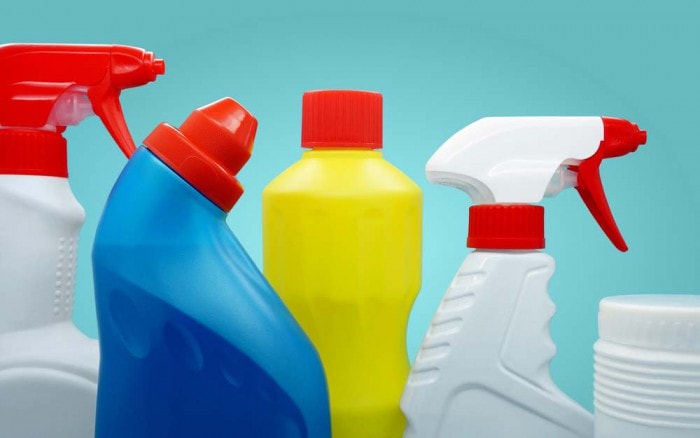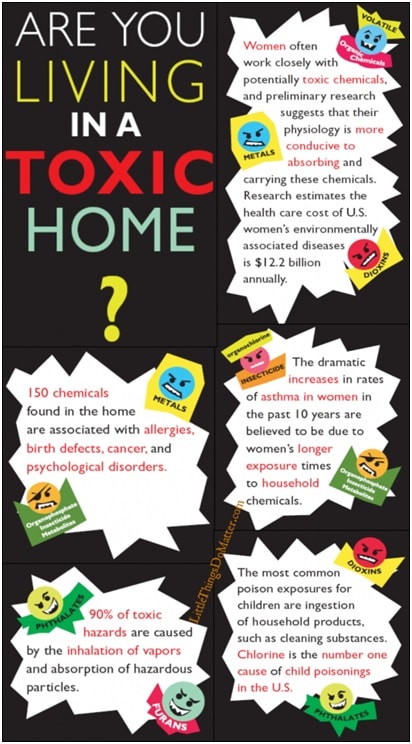
Maintaining a clean home and garden comes at a fair cost. Studies indicate that naïve-looking household cleaning products significantly contribute to health concerns. Typical cleaning supplies and lawn care products are loaded with ingredients that are dangerous for health. In fact, every 1 in 3 chemical-based cleaning product contains a component that is harmful to both the environment and your health.

A study by EPA confirms that toxic chemicals present in these cleaning supplies tend to multiply the odds of cancer. The study found out that these chemicals are three times more likely to birth cancer than outdoor air. Research is also digging out a strong association between the use of household chemicals and the occurrence of chronic illnesses among children.
Toxic chemicals in common cleaners used in home
The majority of the home cleaning supplies are packed with endocrine disruptors, neurotoxins, mutagens, teratogens, carcinogens, and more. Each of these toxins plays a different damaging role than the other, therefore, contributing to serious health issues.
These supplies commonly contain volatile organic compounds (VOCs) too, which stay in the air long after their use. These negatively impact the health of your kidneys, the central nervous system, and liver. On top of that, these ingredients are non-biodegradable by nature, therefore, leaving a negative imprint on the environment.

The use of these cleaning and caring products has risen steadily. More than 72,000 synthetic chemicals have been formed since World War II. What’s more is that we spend a lot of time indoors where these chemicals are mainly used. About 90% of the time is spent within four walls. Of this, moms, infants, and the elderly spent about 65% of their time at home.
Unfortunately, this gives the toxic chemicals more time to leave their negative consequences on your health.
The exposure to lawn care chemicals while gardening
Exposure to lawn care chemicals is also increasing as more people take to maintain beautiful gardens, according to terranovaalberta.ca, a known landscape design company in Canada. The Center for Disease Control and Prevention conducted a study of 9,282 individuals. The study uncovered that an average person carried about 13 pesticides out of the 23 tested.
Furthermore, homeowners use about 100 million pounds of pesticides in their gardens and homes every year. These pesticides come to a crescendo of health effects that include congenital disabilities, and cancer to name a few. The EHHI reports, “Some chemicals commonly used on lawns and gardens have been associated with birth defects, mutations, adverse reproductive effects, and cancer in laboratory animals.”
These chemicals tend to invade your home too and contaminate surfaces and the indoor air. Therefore, exposing children to their unhealthy consequences as well.
Health implications of home & garden maintaining products
With the background of increased exposure to chemical-enriched household and lawn care products, here is a look at possible health implications:
1. Pesticide poisoning with the use of pesticides in gardens
Pesticides used in lawn care to kill pests can lead to pesticide poisoning. The toxic chemicals present in these remain active for a month or more after initial application. In certain cases, the chemicals can be active for about a year. Moreover, these chemicals release vapors that are harmful to health.
Pesticides are likely to attack important systems in the body including the central nervous system when they get inside. Some common symptoms of pesticide poisoning include chest tightness, muscle pain, seizures, nausea, cramps, anxiety, tissue swelling, and more. The CDC points out that long-term exposure to pesticides can also affect pregnant women severely. The chemicals can pass from the placenta to the developing baby. Such a move may cause learning disabilities, hamper brain development, and lead to other neurobehavioral problems.
2. Enhanced risk of lung damage with household cleaning sprays
Toxic chemicals present in the household cleaning supplies can damage your lungs as well. A Norwegian study confirms this. The investigation extended to a period of 20 years and had a participant pool of 5,000 women. It dug out that typical cleaners reduced lung functioning by 17%.
The study concluded that using these cleaning supplies multiplies the risk of obstructive pulmonary disease including emphysema and chronic bronchitis. Scientists also warn that home cleaning sprays are as damaging for the lungs as smoking 20 cigarettes daily. In contrast, microfiber cloth wipes with water are safer cleaning options.
3. Detergents linked with neurodegenerative diseases and skin concerns
Detergents are known for dissolving fat, which makes them harmful to fatty areas of the body. These include endocrine glands, brain, and the fatty layering that protects the organs. Chemicals present in detergents can eat away the fatty nerves and brain cells.
Subsequently, it is possible that long-term exposure to these can amp up the odds of developing neurodegenerative diseases like dementia. Moreover, detergents are likely to reside in washed bedding and clothing. This gives the chemicals in this common laundry product a chance to negatively affect your skin. Therefore, detergents can cause skin issues like rashes, inflammation, and sensitization.
4. Bleach can lead to skin irritation
Bleach used at homes consists of a chemical termed sodium hypochlorite. This is present in varying concentrations that fall within the range scale of 0.7% to 5.25%. The bleach liquid, as well as vapors, can irritate the eyes, skin, throat, and nose. You can also develop dermatitis with direct skin contact. Over and above that, ingestion can culminate in stomach irritation, prolonged vomiting and nausea, and esophageal injury.
5. Health effects of other home and garden cleaners
Numerous other household cleaning products culminate in other health concerns. These include but are not limited to:
- Chlorine, ammonia, ethanol, and formaldehyde containing disinfectants cause depression and damage
- Carpet cleaners can lead to dizziness and declined appetite in the short run. In the long haul, exposure to these can damage the central nervous system. Besides, Perchloroethylene that is commonly present in carpet cleaners is a carcinogen
- Multipurpose cleaning products correlate with rashes, chemical burns, and dermatitis
- Lye present in oven cleaner is corrosive and can burn your eyes and skin. It can also give rise to severe tissue damage
- Air fresheners enter the blood circulation quickly if these are sprayed in a small space. These chemicals can result in damage to the heart muscle and come to a finale of nerve deadening as well. Room fresheners can lead to lung allergies too
Key takeaway
Multiple health concerns surface with repeated exposure to chemicals present in household and lawn care products. It is wise to read the information on each product carefully before adding it to your cart. Or, you can simply switch to DIY cleaning formulas.
Author Bio

Jean Francia is a business associate of a landscape company based in Canada. She is often online surfing the web for new and hot topics in different niches.
